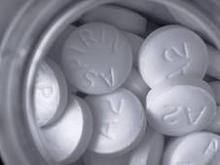Postmenopausal women who used aspirin regularly had a significantly lower risk of melanoma in an observational study from the Women’s Health Initiative including nearly 60,000 women, according to results published online in Cancer on March 11.
The longer the women took aspirin, the lower their risk for melanoma. Acetaminophen and other NSAIDs had no protective effects.
"These findings suggest that aspirin may have a chemopreventive effect against the development of melanoma, and further clinical investigation is warranted," senior investigator and dermatologist Jean Tang of Stanford (Calif.) University and her colleagues concluded (Cancer 2013 March 11 [doi: 10.1002/cncr.27817]).
The analysis included 59,806 white, postmenopausal women aged 50-79 years who completed questionnaires about their aspirin and NSAID use as part of the Women’s Health Initiative, a federally funded effort to address the most common causes of death, disability, and impaired quality of life in postmenopausal women.
At baseline, 25% of the women reported regular aspirin use (defined as use of aspirin at least twice in the past 2 weeks). Of these, 75% reported using regular or extrastrength aspirin. A total of 15% of the women reported nonaspirin NSAID use at least twice in the prior 2 weeks. Ibuprofen and naproxen were the most commonly used nonaspirin NSAIDS. Approximately 60% of the women reported no regular use of aspirin or other NSAIDs.
The women were asked again about their aspirin and NSAID use at a second clinical visit after 3 years; 59% of aspirin users and 38% of NSAID users reported the same levels of medication use.
A total of 548 incident melanomas occurred during a median follow-up of 12 years: 289 melanomas in situ, 255 invasive melanomas, and 4 cases classified as unknown. The risk of melanoma was 21% lower in regular aspirin users compared with women who reported no aspirin use (hazard ratio, 0.79). Increased duration of aspirin use (less than 1 year, 1-4 years, and 5 years or more) was associated with an 11% lower risk of melanoma for each categorical increase.
In addition, the risk of melanoma was 30% lower in women who used aspirin regularly for 5 or more years (HR, 0.70). The incidence of melanoma per 100,000 person-years was 69.8, 87.9, and 87.1 for aspirin users, nonaspirin NSAID users, and NSAID and aspirin nonusers, respectively.
Dr. Tang and her colleagues controlled for skin cancer histories, sun exposure, sunscreen use, and other potential confounders in their analysis. At baseline, "the most important predictors of melanoma risk, prior nonmelanoma skin cancer and melanoma history, did not differ among the groups," they noted.
Although previous studies have shown a protective effect for aspirin and other NSAIDs against gastric, colorectal, and breast cancers, the results for melanoma have been mixed, possibly because negative studies used too low a dose of aspirin or the dosing was too infrequent, the researchers noted.
Similarly, infrequent use of nonaspirin NSAIDs may account for their lack of benefit in the trial, or "aspirin may have properties that other non[aspirin] NSAIDs lack," the investigators noted.
"Our finding that increased duration of aspirin use was associated with lower risk of melanoma after extended follow-up is consistent with studies of other malignancies, particularly colorectal cancer, that reported benefit after several years of aspirin use and extended follow-up. ... Cardiovascular benefits and potential antitumor effects of aspirin are particularly intriguing in the context of preventive medicine, but they must be weighed against well-known risks, such as gastrointestinal bleeding," they wrote.
The study was sponsored in part by the National Heart, Lung, and Blood Institute and the National Institute of Arthritis and Musculoskeletal and Skin Diseases. Dr. Tang is a consultant for Genentech.


